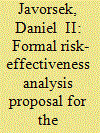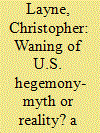| Srl | Item |
| 1 |
ID:
140996


|
|
|
|
|
| Summary/Abstract |
Information security has quietly played a significant role in the development of the contemporary U.S. hegemony in world affairs. In addition to safeguarding its most vital technological advancements, information security has preserved its tactical advantage by protecting the “ways and means” of intelligence collection and served as the foundation for U.S. military dominance.1 In part due to these efforts, U.S. weapon systems have dominated the conventional battlefield since the end of the Cold War, but recent trends indicate this margin may be shrinking. Using defense related spending as a proxy for future military dominance; a recent study suggests that by 2035, U.S. spending could be eclipsed by a resurgent China that, at 2.3 million strong, already has the world's largest active military force.2
|
|
|
|
|
|
|
|
|
|
|
|
|
|
|
|
| 2 |
ID:
182535


|
|
|
|
|
| Summary/Abstract |
The following study analyzes the exercise of power by both the United States and China in their confrontation for hegemonic dominance. Through observational and qualitative methods, an examination of the mechanisms underlying China's strategic statecraft and how it implements its exercise of power reveals its genesis and how it contested and controlled the order in Southeast Asia. Navigating through economic indicators, the research determines that the decline of American power is a myth, but it establishes a decline in its influence and prestige arising from its strategic and tactical choices. The study identified multiple systemic contingencies and political irrationalities for the non-realization of systemic unipolarity, resulting in a nonpolar world. It concludes that neither the incomparable military power of the United States nor the greater economic power of China has, in the contemporary world, fundamental comparative advantages for achieving systemic hegemony.
|
|
|
|
|
|
|
|
|
|
|
|
|
|
|
|
| 3 |
ID:
164260


|
|
|
| 4 |
ID:
090996


|
|
|
|
|
| Publication |
2009.
|
| Summary/Abstract |
Over the next two decades, international politics will be shaped by whether the international system remains unipolar or is transformed into a multipolar system. Can the United States sustain its primacy? Or will the emergence of new great powers reorder the distribution of power in the international system? If U.S. power is waning, will power transition dynamics result in security competitions and an increased possibility of war? In particular, what are the implications of China's rapid ascent to great power status? If the United States is unable to preserve its hegemonic role, what will happen to the security and economic frameworks that it took the lead in creating after the end of World War II and that have provided the foundation for the international order ever since? In a world no longer defined by U.S. hegemony, what would become of globalization and the open international economic system that the United established after World War II and expanded after the Cold War ended? This essay reviews five publications that grapple with these questions: Stephen G. Brooks and William C. Wohlforth, World Out of Balance: International Relations and the Challenge of American Primacy; Parag Khanna, The Second World: Empires and Influence in the New Global Order; Kishore Mahbubani, The New Asian Hemisphere: The Irresistible Shift of Global Power to the East; National Intelligence Council, Global Trends 2025: A Transformed World; and Fareed Zakaria, The Post-American World.
|
|
|
|
|
|
|
|
|
|
|
|
|
|
|
|